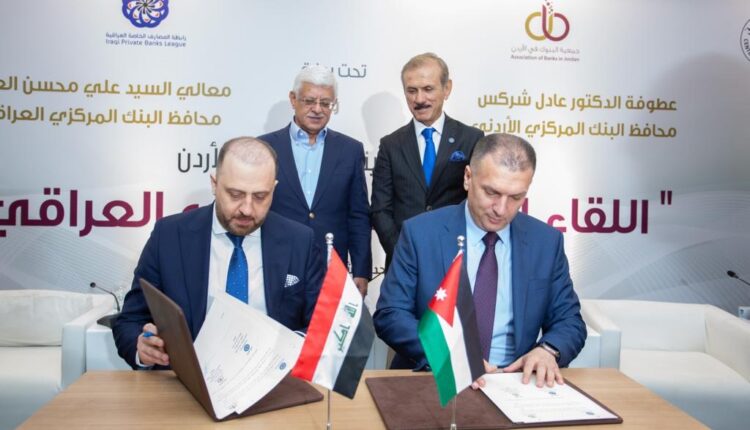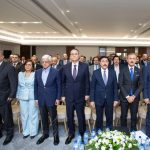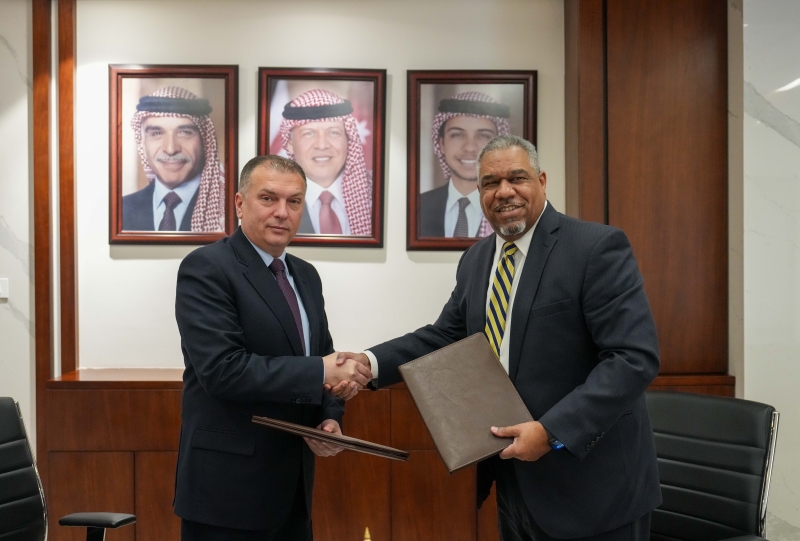
Memorandum of Understanding between the Jordanian ABJ and the Iraqi Private Banks League
Renewal of the Jordanian-Iraqi Banking Cooperation Agreement in the field of combating money laundering
Al-Olaq: Iraq is committed to facilitating trade transactions through a smooth and flexible banking system.
Sharkas: Commitment to the highest standards in money management and compliance with laws.
Al-Shamali: Jordanian exports to Iraq increased by 56%, reaching a billion dollars in trade.
Al-Hanandeh: Significant interaction of Jordanian companies with the Iraqi market, given the reality of electronic banking services and transactions in Iraq.
Al-Saqqaf: Iraqi investments in Jordan rank second at $12 billion.
Al-Salem: Iraq is considered one of Jordan’s most important trading partners, with significant Jordanian investments in Iraq.
Al-Hanzala: A noticeable growth in trade and investments between Iraq and Jordan.
The ABJ held the first Jordanian-Iraqi Banking Meeting on Sunday, under the patronage of the Governor of the Central Bank of Jordan, Dr. Adel Sharkas, and the Governor of the Central Bank of Iraq, Ali Mohsen Al-Alaq. The meeting was also attended by the Jordanian Ambassador to Iraq, Montaser Al-Aqla, the Chairman of ABJ, Basem Khalil Al-Salem, and several chairpersons of bank boards from Jordan and Iraq.
During the event, ABJ signed a Memorandum of Understanding with its Iraqi counterpart, the Association of Iraqi Private Banks, aimed at enhancing cooperation between both sides to serve the interests of the banking sectors in both countries.
A panel discussion was organized, moderated by the economic writer Salama Al-Darraawi, who called for the continuity and establishment of such meetings to promote trade and economic exchanges between the participating countries. He emphasized that economic relations between Jordan and Iraq have not yet reached the desired level, despite the strong desire to develop various sectors.
The Governor of the Central Bank of Iraq, Ali Mohsen Al-Alaq, pointed out that there are several ongoing projects, such as the Special Economic Zone and others, but he clarified that the pace of growth in these projects is still lower than expected.
Al-Alaq affirmed the continuous efforts to enhance economic relations between the two countries. He mentioned challenges related to financial transfers and exchange rate fluctuations but noted that the relationships between the central banks of Iraq and Jordan have shown significant improvement.
He also stated that there is a great willingness and readiness for further cooperation with the Jordanian banking sector, emphasizing that Iraq is committed to facilitating trade transactions through a smooth and flexible banking system.
He added that the new money transfer system provides protection and security for all parties involved, emphasizing that transactions are conducted transparently and systematically, which builds trust among banks and international financial institutions.
In conclusion, Al-Alaq expressed his hope for the continued cooperation and coordination between the Central Bank of Iraq and its Jordanian counterpart. He affirmed the strong and historical relationship between the two countries and Iraq’s commitment to benefiting from the experiences and developments in the field of banking and financial services.
On his part, Dr. Adel Sharkas, the Governor of the Central Bank of Jordan, expressed his vision for banking relations between Jordan and Iraq. He explained that the relationship between the two countries is strategic and historical, noting that Jordan is ready to assist Iraq and share expertise in various fields.
He announced the renewal of the banking cooperation agreement that was first signed in 2015, adding that recent challenges and developments in the world have created opportunities to enhance cooperation in areas such as combating money laundering, technology, and digital transactions.
Dr. Sharkas also highlighted the progress made by the Jordanian banking sector, where deposits reached 42 billion Dinars and loans reached 33 billion Dinars. He expressed his hope for the exchange of experiences between the two countries to build an integrated economy.
Dr. Sharkas clarified that the banking system in Jordan is strong and stable, mentioning financial stability indicators. He also spoke about the development and growth in the number of banking branches both inside and outside the kingdom.
In conclusion, Dr. Sharkas emphasized the crucial role of Jordanian banks in the national economy, emphasizing their commitment to the highest standards in money management and compliance with laws. He expressed his hope for the continuous cooperation between Jordan and Iraq.
Minister of Industry and Trade, Yusuf Al-Shamali, stated that the Jordanian-Iraqi relationship enjoys unprecedented depth and friendship, noting that the relations between the two countries have witnessed continuous development in the past ten years.
Al-Shamali emphasized the importance of the strategic relations between the two countries, highlighting the visit of Prime Minister Mohammed Shia’ Al-Sudani to the Kingdom, describing it as a strong message that underscores the importance of the relationship between the two countries.
He also mentioned participation in the second Baghdad Conference held in Amman, highlighting the historical depth of the relationship between Jordan and Iraq.
The Minister of Industry and Trade also spoke about economic and trade cooperation, pointing to the increase in Jordanian exports to Iraq by 56% and the achievement of a billion dollars in trade exchange.
He highlighted the role of agreements in oil supply, the revival of the Amman-Baghdad pipeline, and the joint efforts to revive strategic projects such as the economic city, which seeks to create job opportunities and investments, and which will enable production within it to serve as Iraqi products.
In the same context, Al-Shamali discussed the topic of electrical interconnection, confirming the start of the first phase and work on the second phase soon, and emphasizing continuous cooperation and the shared belief in the importance and strategy of these projects between the two countries.
Al-Shamali expressed his hope for the enhancement of continuous cooperation and future progress in various fields between Jordan and Iraq.
Minister of Digital Economy and Entrepreneurship, Ahmed Al-Hanandeh, pointed to significant growth in the technology and digital services sector in Jordan over the past years. He emphasized the high competitive advantage of Jordanian companies and highlighted several success stories of companies operating in this sector.
Al-Hanandeh discussed the Iraqi experience and how Jordanian companies have interacted with the Iraqi market in the context of electronic banking and digital transactions in Iraq. He noted continuous development and strong support for digital transformation efforts in Jordan.
He stressed the importance of the financial and banking sector in supporting and achieving the main goals of digital transformation processes. He highlighted the multiple successes and robust infrastructure that have been built, speaking about technology and financial companies and the importance of collaboration between them.
Minister of Digital Economy also emphasized the importance of accelerating strategic plans and improving the legislative environment to integrate with the virtual world, address challenges, and build capabilities for the next phase.
He also touched upon the importance of ongoing cooperation between Jordanian banks and Jordanian companies in achieving digital transformation.
Minister of Investment, Khuloud Al-Saqaf, noted that Iraqi investments in Jordan rank second, with a special focus on real estate, education, tourism, and the banking sector, exceeding a value of 12 billion dollars.
The Minister of Investment mentioned that the Ministry of Investment was established at the end of 2021 to emphasize the importance of investment for the government. A vision for economic reform was provided, and goals to enhance the Gross Domestic Product (GDP) and provide employment opportunities were set.
Al-Saqaf discussed the deep legislative and administrative reforms that have been implemented to improve the investment environment. She highlighted that the new law is a significant step in this direction, where any application that is not responded to within 15 days is automatically considered approved. An electronic platform has been launched to interpret regulations and provide information about available investment opportunities.
The Minister of Investment addressed the economic cooperation between Jordan and Iraq, emphasizing the increasing interest in sectors such as healthcare, tourism, and energy. Discussions on opportunities, challenges, and updates in laws and regulations are ongoing with Iraqi officials, and both countries continue to explore further joint opportunities.
In his opening speech at the beginning of the meeting, the President of the ABJ, Bassem Khalil Al-Salem, praised the strong relationship between Jordan and Iraq and the various events between the two countries. He expressed his hope for enhancing economic and trade cooperation.
He emphasized the importance of further banking cooperation and joint investment between the two countries, in line with the directives of His Majesty King Abdullah II and the Iraqi leadership.
He also touched upon investment relations, noting that Iraq is among Jordan’s top trading partners, and there are significant Jordanian investments in Iraq in various fields.
Al-Salem stressed the importance of expanding the scope of cooperation between the two countries to include more sectors and areas, emphasizing the need to improve the business and investment environment to increase productivity and employment, which will contribute to improving the living standards of citizens in both countries.
In conclusion, he expressed his hope that these discussions would result in successful solutions that contribute to enhancing trade and investment between Jordan and Iraq.
On his part, the President of the Association of Private Banks in Iraq, Wadih Al-Hanzal, spoke about the importance of the Jordanian-Iraqi banking meeting, considering it a demonstration of the significance of economic and trade relations between the two brotherly countries. He emphasized the importance of expanding cooperation in various fields such as energy and transportation.
Al-Hanzal stressed the noticeable growth in trade and investments between Iraq and Jordan and pointed out the significant opportunities available for development in various sectors.
He called for the need for common solutions between the banking sectors to achieve progress and prosperity, as well as to enhance the existing cooperation between the two countries and expand the scope of banking services provided.
Al-Hanzal expressed his hope for great success in this meeting and in future conferences, expressing his anticipation for active participation in the upcoming conference in the Kurdistan region.













